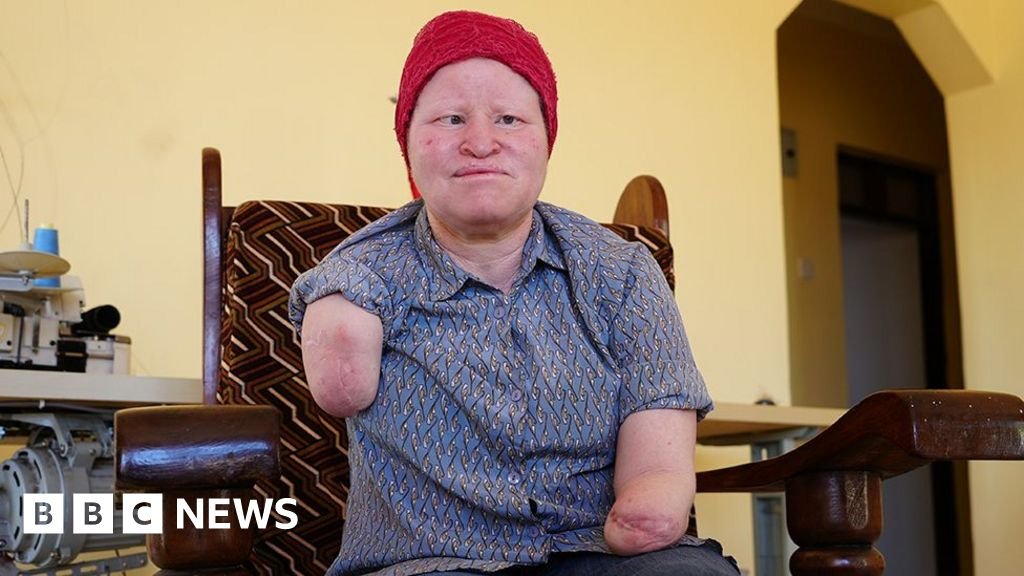
Fears come voting time for those with albinism
Alfred LastekBBC Africa, Northern Tanzania

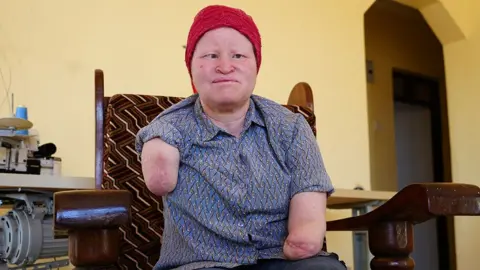 BBC
BBCFor 42-year-old Miriam Stafford, every election season in Tanzania brings fresh trauma.
For most, rallies and songs, like festivals with campaign messages, give people an opportunity to make their voices heard. But for those with albinism, they bring terror.
Warning: This article contains details of graphic violence that some may find disturbing
“The first thing that comes to my mind is fear,” Mariam tells the BBC as people prepare to vote for president and parliament on Wednesday.
“I know that people with albinism are killed especially during elections in Tanzania, when witchcraft beliefs are strong. That’s why I don’t participate in campaigns… I’m very scared.”
Affecting an estimated 30,000 people in Tanzania, albinism is a rare genetic condition that reduces melanin – the pigment that gives color to the skin, eyes and hair.
Superstitions target people of all backgrounds. People with albinism have been attacked and killed across Tanzania due to the mistaken belief that their body parts bring wealth, fortune or political success.
Activists say such attacks intensify when people contest elections for political influence.
Mary knows what this danger looks and feels like personally.
In 2008, one of the bloodiest years for people with albinism in Tanzania as preparations for local elections were underway, knife-wielding men burst into her bedroom in Kagera, a northwestern border region.
“They came late at night, cut off my right arm (above the elbow) and took it away and then they also cut off my left arm.
“The next day I was taken to the hospital, unconscious, and the doctor who saw me said: ‘This person is already dead, take her home and bury her'”.
Against the odds, Mary survived; But she was five months pregnant and did not deliver.

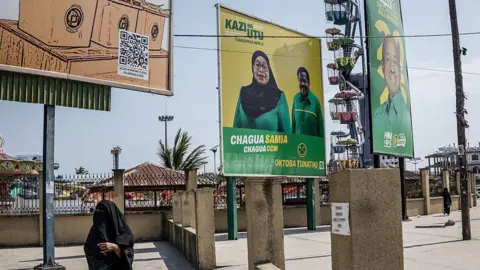 AFP via Getty Images
AFP via Getty ImagesThe attack not only left her permanently disabled, but also forced her to leave Kagera, at the time the center of ritual killings of people with albinism.
She eventually settled in the relative peace of the Kilimanjaro region, where a rights group for people with albinism, Under the Same Sun, built her a house and trained her to use a knitting machine. She now makes sweaters.
Seventeen years later, the trauma has not subsided.
“Even now I sometimes dream of that night,” says Mariam. “When I wake up, I touch my hands and remember they are not there. It’s something I’ll never get over.”
What happened to Miriam was one of many attacks targeting people with albinism and their body parts.
According to The Same Sun, there have been 211 such incidents in Tanzania since 2008:
- 79 people have died
- 100 people were mutilated but survived
- The three victims were not injured
- Two persons have been kidnapped and are missing
- 27 graves were desecrated and body parts were looted.
While 35 people with albinism were murdered in 2008 alone, many more deaths may go unreported.
The killing sparked global condemnation, prompting government action. At the time, President Jakaya Kikwete condemned the attacks and called for strict action against the killers.
As a result, Tanzania stepped up investigations when it tightened laws against witchcraft-related killings and discrimination of people with albinism.
Efforts have also been made to create public awareness about this.
At a traffic intersection in the northwestern town of Sengerema, a memorial has been erected to commemorate children, women and men with albinism who lost their lives or were maimed in the attack.
The life-size metal statue shows a father carrying a son with albinism on his shoulders while a mother protects him from the sun.
Maryam’s name is engraved in the monument.
Mariamu, who was killed in 2008, was just five years younger than Emmanuel.
Sitting at his home in Mwanza, her brother, Manyashi Emmanuel, now 25, recalls that day. The pain still haunts him.
“I was eight years old, and I saw her legs, arms and tongue pulled out by attackers. I’ve been scared ever since. It’s the hardest when we hear about attacks so close to elections.”
Attacks continue despite awareness campaigns.
In June this year, there was one recorded in the northwestern city of Simyu. The victim was not injured but has now been shifted to a safe house.
President Samia Suluhu Hassan recently warned against what she called harmful traditional beliefs that have no place in Tanzanian elections.
Seni Ngaga, district commissioner of one of the areas prone to attacks, says government education campaigns have increased awareness, but rural areas are vulnerable to superstition and discrimination.
She wants more involvement from everyone in the community to stop the attacks.
“We recently held a festival with traditional healers where we sat together and talked,” the commissioner tells the BBC.
“As elections approach, we advise them to be good ambassadors to ask others to reject such acts and to ensure that people with albinism are protected.”

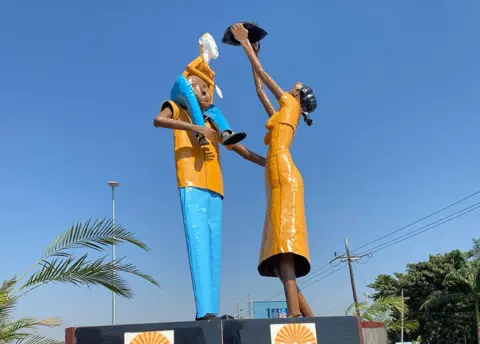
While campaign groups and survivors say the government still needs to do more, some progress has been made.
Awareness campaigns, civil society programs and school inclusion initiatives have helped reduce attacks in some areas.
Communities are slowly coming to understand that people with albinism are not cursed and that superstitions can have fatal consequences.
But last year’s killing of two-year-old Asimwe Nowath, abducted from her home in Kagera region, was a reminder that the problem is far from over.
Witnesses said the girl was playing with her mother when she was forcibly taken away by two unknown persons.
Seventeen days later, parts of Asimwe’s body were found in a sack, dumped under a bridge in the same region. Later her body was buried at her family home.
Nine suspects have been charged with premeditated murder in the murder, but the case remains unsolved.
The case brought back troubling memories for Maryam.
“It took me back to the night of my own attack in 2008. I know that pain and I know her mother will never forget it.”
Her experience means that fear is a part of her daily life. She avoids crowds and rarely leaves the house.
As Wednesday’s vote approaches, Maryam says she won’t vote, skeptical of the difference it will make in her life.
Instead, she will spend her days quietly at home on Kilimanjaro.
You may also be interested in:

 Getty Images/BBC
Getty Images/BBC




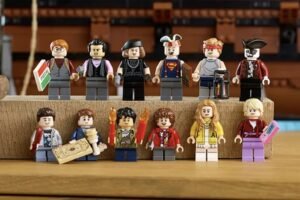



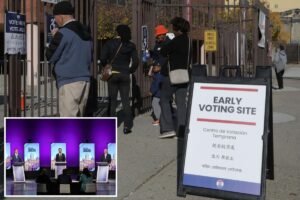

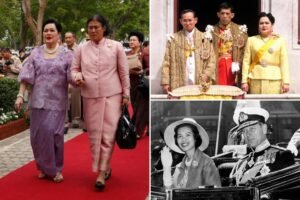
Post Comment